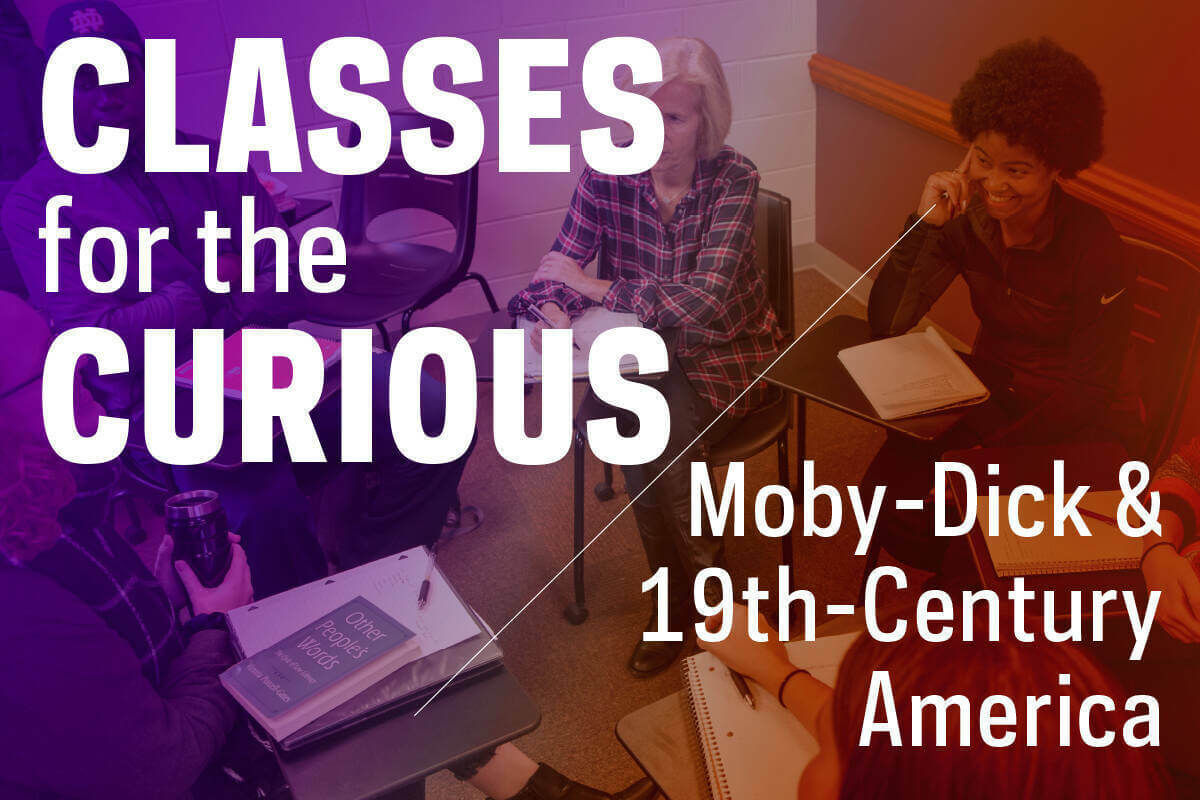
This is the first in a new series of Q&As with undergraduate students about fascinating Arts & Letters courses. More installments in Classes for the Curious will be available soon.

The class: Moby-Dick & 19th Century America
The professor: James (Jake) Lundberg, associate professor of the practice and director of undergraduate studies, Department of History
The focus: Exploring Herman Melville’s 1851 masterpiece as a gateway into learning about life in 19th-century America as a whole.
The syllabus: A small, seminar-style class in which students read the massive novel throughout the course along with supplementary readings that further their understanding of the text.
Sophomore history and political science major Michael Donelan considers the class to be one of the most exciting courses he has taken while at Notre Dame. The following Q&A with him has been edited for clarity and brevity:
When you give the “waiting in the dining hall” spiel about the class to a friend, what do you say?
It’s a behemoth of a class, so it’s hard to really boil it down, but I’d say, for one, that Professor Lundberg’s just really high energy and engaging. He just comes up with incredible ways to connect Melville to the questions Melville is wrestling with to our own day and our own experiences and really make this dense 19th-century book accessible and fascinating.
You also see how much the 19th century relates to your present world and how much the questions of the time really haven't changed, like conservation, humanity's relationship to nature, or our relationships to each other.
You get to wrestle with really big questions that people centuries ago were also wrestling with and see how they dealt with them and reflect on your own experiences. I’d say slavery, ecology, social relationships, and industrialization are the four big topics of the course.

How have the students engaged in the class together?
Professor Lundberg calls us all shipmates! Moby-Dick is all about going on this voyage to really confront the brutal realities of life and existence, and the joke is we're kind of also on the same voyage — and it's a very meta book.
Probably the coolest thing has been wrestling with these questions with other students and realizing how relevant they still are, from ecological concerns to these sort of metaphysical questions. Melville is thinking about industrialization and these questions of whether humanity is exploiting nature, and he's also obviously writing at the time of the Civil War, so slavery is another major topic.
Why do you think there’s a whole class about this book?
I think it really captures a lot of the big questions of 19th-century America, so it is an excellent case study for American history at that point. And Melville’s really trying to kind of confront the entire universe or his entire world at the time, so that's a major theme of the book — how do you squeeze a whale down into a single book? How do you squeeze the entire universe into a single book? Not everything fits in there, but it’s pretty much as good as you can get as a survey of 19th-century American history.
Is it literally just about being on a boat?
Walking in, I thought it was, but it’s so much more. So the main character, Ishmael, goes on this voyage to hunt and capture sperm whales, because they get oil from the sperm whales’ heads and turn into candles or they use it to lubricate machinery. It really was closely related to industrialization and all these other phenomena happening.
The captain of the ship, Ahab, has this grudge with the white whale, which is this sperm whale that bit off his leg on his last voyage. It’s really about his, as Melville writes, monomaniacal voyage to kill that whale and to sort of exact revenge for the entire human race, so it connects to a lot more and is a much bigger story than you would think it is.
What’s one thing that has stuck with you from the class?
So much is really humanizing people who were experiencing the 19th century, and it shows that they’re dealing with the same problems you are. They’re having, obviously, very different but comparable experiences, so it just shows how the big questions of life don’t change and how much you have in common with historical figures.
How do class sessions help you better understand the book?
When you do the reading, you come away with your own conclusions. And then there have been some class sessions where I came in and I was just astonished at this diversity of takeaways that everyone had. It really helps to compare your takeaway with what everyone else ended up with.
It’s sort of like we’re reaching the meaning together. It can be a really tough, dense book at times, and one of the points is that there are a lot of meanings and different chapters and events. So, to be able to work through it with your classmates is really helpful.
“So much (of the class) is really humanizing people who were experiencing the 19th century, and it shows that they’re dealing with the same problems you are. They’re having, obviously, very different but comparable experiences, so it just shows how the big questions of life don’t change and how much you have in common with historical figures.”


